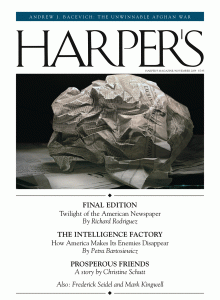 It’s in the Nov 09 Harper’s (pictured, right). The pizzicato paragraph structure, the prose itself, the density of its Bay Area history. It’s incredible:
It’s in the Nov 09 Harper’s (pictured, right). The pizzicato paragraph structure, the prose itself, the density of its Bay Area history. It’s incredible:
In the nineteenth-century newspaper, the relationship between observer and observed was reciprocal: the newspaper described the city; the newspaper, in turn, was sustained by readers who were curious about the strangers that circumstance has placed proximate to them. So, I suppose, it is incomplete to notice that the San Francisco Chronicle has become remiss in its obituary department. Of four friends of mine who died recently in San Francisco, not one wanted a published obituary or any other public notice taken of his absence. This seems to me a serious abrogation of the responsibility of living in a city and as good an explanation as any of why newspapers are dying. All four of my friends requested cremation; three wanted their ashes consigned to the obscurity of Nature. Perhaps the cemetery is as doomed in America as the newspaper, and for the same reason: we do not imagine death as a city.
The essay’s relentlessly bleak, completely disinterested in pointing out what might come in place of the daily morning newspaper to act as an improvement on the earlier model. (Did folks fret this much when the evening newspaper died back in the middle of the last century? Has anyone missed it?) But I do appreciate Rodriguez’s linking the newspaper’s decline not to “The Internet” but rather to the decline of the importance of place in our lives. I appreciate it as a fresh contribution to an otherwise rank and bloated conversation.
Continue reading Richard Rodriguez on Newspapers Dying